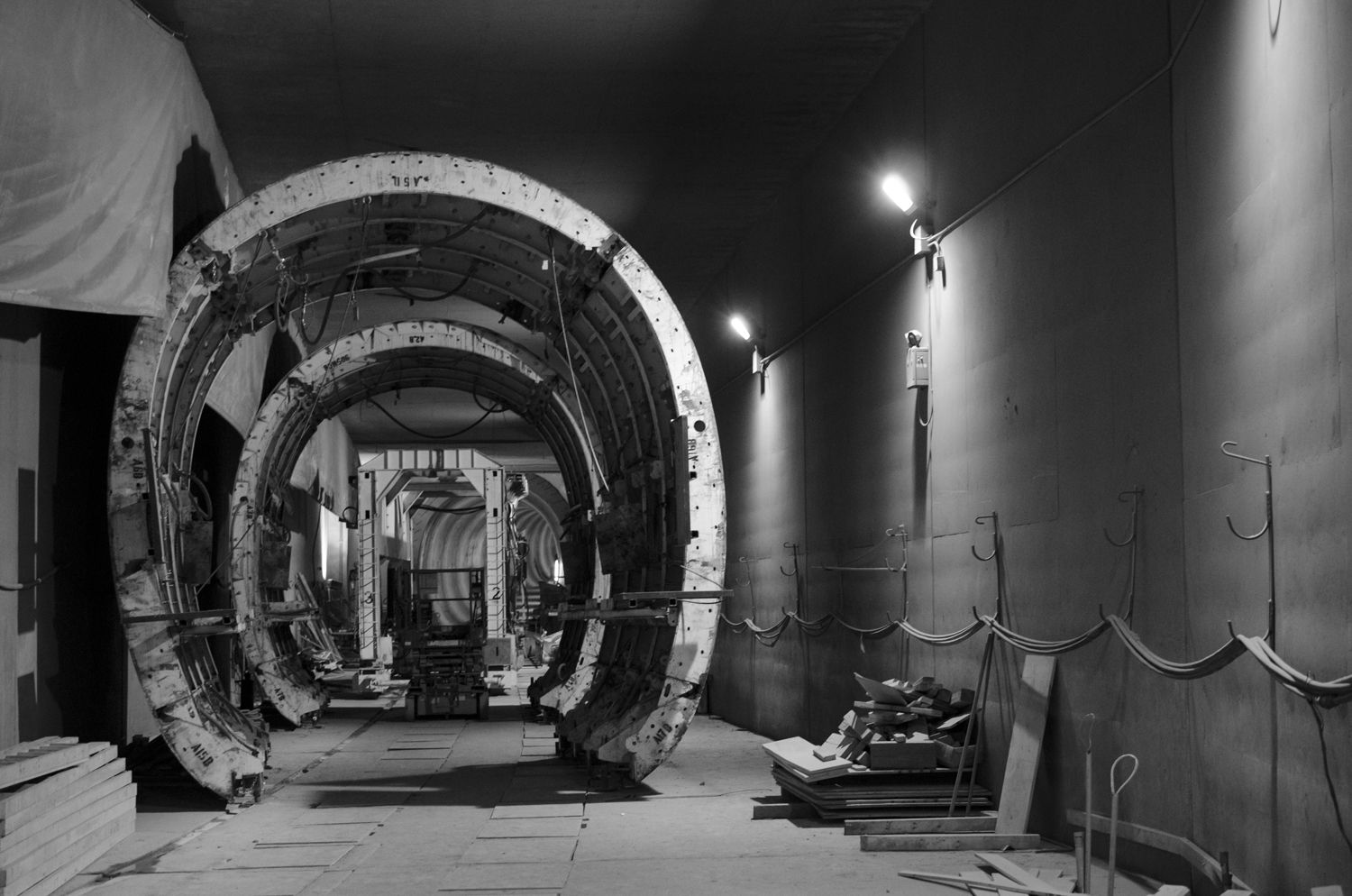Project News
Crews Dig Deep on Flatiron Tunneling Project

Work is progressing on a major Flatiron tunneling project. The North Light Rail Transit project is a 3.3 kilometer (about two mile) extension of the existing light rail network in Edmonton, Alberta.
Flatiron is a subcontractor on the project for construction management team North Link Partnership, a joint venture of SNC-Lavalin Group and Graham Infrastructure. Flatiron is responsible for the construction of two twin tunnels.
The twin north- and southbound tunnels begin near the location for the new MacEwan Station, run underneath 101st Street and through a sub-basement of the Epcor Building, before continuing on to the existing Churchill Station for a total length of 875 meters of tunnel. Each tunnel is about six meters in diameter, but the tunnels are egg shaped, a bit taller than they are wide. The first eleven months of the project consisted of tunnel excavation. Crews worked 24 hours a day, seven days a week to stay on schedule, completing work in early November.
“The excavation was sequential, repetitive work to advance the tunnel,” said Flatiron project manager Dan Martinson. “But the crews worked diligently to get it done safely and as quickly as possible.”
Crews are now working on lining the tunnel with concrete. During excavation, the tunnel was lined with shotcrete to provide temporary stability. To permanently line the tunnel, crews apply waterproofing over the shotcrete, install rebar, then place concrete. Concrete for the lower half of the tunnel (called the invert) is installed first. The crews use a monorail system which is installed in the roof of the tunnel to transport the invert form incrementally down the tunnel. When setting the form, the leading end of the form is lifted from the monorail, while the back end has legs with wheels which can be driven down the previously placed segment of invert concrete.
A separate system is used for the arch (or upper half) of the tunnel lining. The arch forms are collapsible, so that after arch concrete has been placed and set, the forms fold in on themselves and rest on a carrier which moves them forward along the invert concrete so they can be set for the next segment. Each completed segment of concrete lining is approximately 12 meters long. The project has a total of more than 250 separate concrete placements.
Crews are working 24-hour shifts to complete the work, and can complete 12 meters of invert in about 24 hours. Placing the arch concrete is a bit more complex, and it’s currently taking about 48 hours per 12 meter section, but Dan expects the speed will increase as crews get more experience.
According to Dan, one of the biggest challenges is only having one entrance. “There are a lot of logistics of managing people, equipment and material with only one access point—it makes everyday things more difficult,” he said. “It’s like a game of chess—you have to be able to think a few steps ahead to make sure you’re not creating a conflict with future work or equipment moves.”
Dan has been with Flatiron for 10 years, and like many others on the project, this is his first tunnel.
“For the majority of people on the team, this is their first tunneling job,” said Dan. “It’s been challenging because it’s so different from the typical Flatiron project, but it’s something new, which makes it pretty exciting.”
There are a lot of different parties involved on the project, including a number of tunnel experts from Germany, who have helped initiate the team to tunneling work. They even brought a few unique traditions with them.
“They put up a miniature shrine to Saint Barbara, with a statue, flowers and candles to watch over the work,” said Dan. “They also taught us a German phrase, ‘Glückauf’. It’s a miners greeting you say to help ensure you return safely from the mine.”

Germans working on the project put up a miniature shrine to Saint Barbara – a tradition said to help workers return safely each day.
Once the tunnel is lined, next up is constructing the transitions between the tunnels and the station at the end of the line.
“We’re tying in a round concrete tunnel to a rectangular opening at the station—so it’s a bit like fitting a square peg into a round hole,” says Dan. “The design is being finalized right now. It will take five separate concrete placements for each transition.”
Flatiron’s portion of the work will be complete in June, and the North Link Partnership will install the power, signaling and rail systems. The line will open to the public in the spring of 2014.

